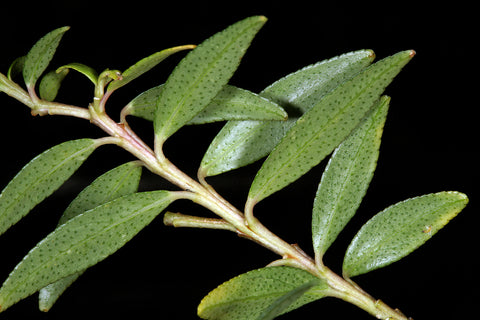The Health Benefits of Buchu Leaf
August 24, 2023
Buchu leaf is an herb that is not very common today, but has been used in Africa for centuries for its numerous potential health benefits. Indigenous to South Africa, the Buchu plant has a rich history of traditional use for various purposes, and its leaves are known for their aromatic scent and potential therapeutic properties. In this article, we explore the properties of Buchu leaf, including its benefits, uses, and potential side effects.
What is Buchu Leaf?

Buchu leaf comes from the Buchu plant (Agathosma betulina), a small shrub that grows in the Western Cape region of South Africa. The plant is characterized by its small, shiny leaves, as well as its clusters of white or pink flowers. The leaves of the Buchu plant are highly aromatic, with a scent that is often described as a mix of black currant and peppermint. This distinctive aroma is due to the presence of essential oils within the leaves.
For centuries, the indigenous Khoisan people of South Africa have used Buchu leaves for their potential medicinal properties. Traditionally, these leaves were used as a remedy for various ailments, including urinary tract issues, stomach discomfort, and even as a natural insect repellent. The leaves were often brewed into teas or used topically as poultices.
Buchu Leaf Benefits: What Are the Health Benefits of Buchu Leaf?
Buchu leaf has many traditional uses. Some of the most common benefits of buchu leaf include:
1. Urinary Tract Health
One of the most well-known benefits of Buchu leaf is its potential to support urinary tract health. The leaves contain compounds such as diosphenol, which are believed to have diuretic properties. This diuretic effect may aid in flushing out toxins and excess fluids from the body, potentially benefiting those with urinary tract discomfort. (1)
Buchu leaf is most popularly used today for its urinary tract benefits and for supporting relief from urinary tract infections (UTIs). For this reason, we use Buchu leaf in our Urinary & Renal System Support Tonic.
2. Anti-Inflammatory Properties
Chronic inflammation is a common health issue that affects millions of people today and is at the root of many health problems. Buchu leaf contains various bioactive compounds, including antioxidants, that possess anti-inflammatory properties. (2) These properties may be useful in managing inflammation-related conditions in the body.
3. Digestive Support
In traditional African medicine, Buchu leaf was often used to alleviate stomach discomfort and aid digestion. Its mild antispasmodic properties might help soothe digestive issues and reduce abdominal cramps. (3)
4. Antimicrobial Activity
Essential oils found in Buchu leaves, such as limonene and menthone, have shown potential antimicrobial effects against certain bacteria and fungi. (4) This property suggests that Buchu leaf might contribute to maintaining oral health and preventing infections.
5. Aromatherapy and Relaxation
The aromatic qualities of Buchu leaf have also made it a popular choice in aromatherapy. The scent is believed to promote relaxation, alleviate stress, and uplift mood.
Types of Buchu Leaf Preparations & Uses

Below, we will discuss some of the common uses and preparations of Buchu leaf:
-
Herbal Teas: One of the most common uses of Buchu leaf is in the preparation of herbal teas. The leaves are dried and then steeped in hot water to create a fragrant and flavorful tea. This tea is often consumed for its potential diuretic and digestive benefits.
-
Extracts and Supplements: Buchu leaf extract is available in various forms, including capsules, tinctures, and oils. These extracts are concentrated forms of the beneficial compounds present in the leaves and are often used for their potential health-promoting effects.
- Topical Applications: In traditional medicine, crushed Buchu leaves were applied topically as poultices to address skin conditions, such as wounds, burns, and insect bites. However, before using Buchu leaves topically, it's important to perform a patch test to ensure there are no adverse reactions.
Buchu Leaf Potential Side Effects
While Buchu leaf offers several potential benefits, it's crucial to be aware of potential side effects and considerations:
-
Kidney Health: Due to its diuretic effect, excessive consumption of Buchu leaf products might put strain on the kidneys. Individuals with pre-existing kidney conditions should exercise caution and consult a healthcare professional before using Buchu supplements.
-
Allergic Reactions: Some individuals may be sensitive or allergic to certain compounds present in Buchu leaves. If you experience any adverse reactions, such as skin rashes, swelling, or breathing difficulties, discontinue use and seek medical attention.
-
Pregnancy and Lactation: Pregnant and breastfeeding individuals should avoid Buchu leaf products, as their safety during these periods has not been established.
- Drug Interactions: Buchu leaf supplements may interact with certain medications, including those with diuretic effects, blood thinners, and anti-inflammatory drugs. Consult a healthcare professional before using Buchu if you are taking any medications.
Summary
Buchu leaf, with its aromatic fragrance and potential health benefits, has a long history of traditional use in South Africa. From supporting urinary tract health to providing anti-inflammatory and antimicrobial properties, Buchu leaf offers a range of potential advantages. However, like any herbal remedy, it's important to consult a healthcare professional before use, especially if you have pre-existing health conditions or are taking medications. Whether enjoyed as an herbal tea, supplement, or in aromatherapy, Buchu leaf is a unique herb with many potential health benefits.
References
1 https://www.ncbi.nlm.nih.gov/books/NBK557838/
2 https://www.ncbi.nlm.nih.gov/pmc/articles/PMC8859318/
True Health Starts with Feeding the Body

